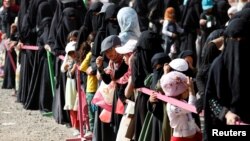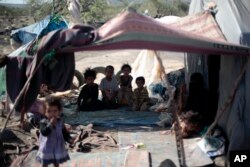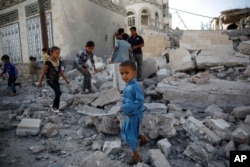A majority of Yemenis are facing severe food insecurity, according to a new joint assessment by the United Nations and partners.
The latest Integrated Food Security Phase Classification (IPC) shows that 19 or 22 governorates of Yemen face severe food insecurity, and that over half of the country's population faces "emergency" levels, the fourth level on a five-tier system of food insecurity classification.
Fuel shortages and import restrictions have contributed to the food shortages in war-torn Yemen. The country imports nearly 90 percent of its food staples, and fuel imports in March satisfied only 12 percent of its needs.
'One of the worst crises in the world'
“The IPC results clearly show the huge magnitude of the humanitarian crisis in Yemen,” said Jamie McGoldrick, U.N. humanitarian coordinator for Yemen. “This is one of the worst crises in the world and is continuing to get worse. Conflict has taken a very heavy toll on the country and its people, exacerbated widespread vulnerability and virtually destroyed household coping mechanisms. As a result, food insecurity, remains unacceptably high.”
“With the fluidity of the situation and until a political solution is in place, we will continue to see an increase in the number of people struggling to feed themselves and their families and further deterioration in food security across Yemen,” said Purnima Kashyap, representative and country director of the World Food Program. “We appeal to all parties to ensure unrestricted access for the delivery of humanitarian assistance to affected people.”
The Yemeni government and Houthi rebels have been engaged in a sporadic civil war for many years, but airstrikes by a Saudi-led coalition have dramatically increased death tolls and displacement numbers since they began in March 2015.
At least 3,500 civilians have been killed since airstrikes began 15 months ago, and more than 2.5 million Yemenis have been internally displaced since 2010, according to the United Nations.
The Houthis are supported by former Yemeni president Ali Abdullah Saleh and Iran; they control much of the nation, including the capital Sana’a.











